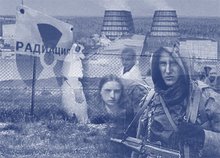08/04/2013 - Trieste, Italy
Nuclear and radioactive materials, though useful and beneficial
in many fields including energy, medicine, agriculture and
industry, could pose a danger to the environment and to the public
if handled improperly.
To help developing countries build effective nuclear security
strategies, ICTP and the International Atomic Energy Agency (IAEA)
are conducting the third annual "International School on Nuclear
Security" in Trieste from 8 to 19 April 2013.
The school, which combines ICTP's international network of
researchers in developing countries with IAEA nuclear security
expertise, plays an essential role in supporting countries' efforts
to prepare experts who are well equipped and qualified to analyse
national nuclear security needs, prevent and combat the threat of
sabotage or the use of nuclear and radioactive material for
criminal or unauthorized acts, and prepare effective response
measures to nuclear security events.
This year's school attracted 182 applicants, of which 48 were
selected, representing 39 countries (7 of which are least-developed
countries). Participants come from regulatory authorities,
universities, research institutes, national ministries, and law
enforcement agencies.
"One of the best ways to ensure the sustainability of a secure
nuclear culture is through education and training," explained Tim
Andrews of the IAEA's Department of Nuclear Safety and Security and
one of the school's lecturers.
Co-sponsored by the Italian Ministry of Foreign Affairs, the
school was initially proposed by the Italian government in 2010
during a Nuclear Summit in Washington, DC, where a number of
nations pledged their support to strengthen global nuclear
security.
"This school is a clear sign of the commitment of the
international community to ensuring nuclear security," said
Giovanni Brauzzi, Deputy Director General/ Principal Director for
Security, Disarmament and Non-Proliferation at the Italian Ministry
of Foreign Affairs in opening remarks at the school.
Brauzzi added, "Italy attaches great importance to the role that
ICTP and the IAEA are taking as disseminators of nuclear security
knowledge, especially in their 'training the trainer'
approach."
More details about the school are available on its
website.
CITS Senior Researcher Dmitriy Nikonov was one of the invited speakers at the School.







